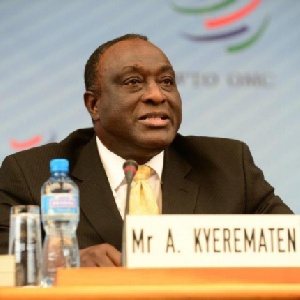Intercepted classified documents have revealed that New Zealand spied on the emails of Ghana’s Alan Kwadwo Kyerematen when he was vying to be a director-general of the World Trade Organisation in 2013.
The covert surveillance operation carried out by the Government Communications Security Bureau (GCSB) was part of a secret operation to help New Zealand’s trade minister Tim Groser win the WTO top position in May 2013.
The spying on emails was targeted at candidates who were vying for the position at the time, a top-secret document has revealed.
“The country’s electronic eavesdropping agency programmed an Internet spying system to intercept emails about a list of high-profile candidates from Brazil, Costa Rica, Ghana, Indonesia, Jordan, Kenya, Mexico, and South Korea,” according to The Intercept and New Zealand Herald.
Despite the covert operation, Groser failed to get the position.
GCSB used a system called XKEYSCORE Internet surveillance for the spying operation. The XKEYSCORE system is run by the National Security Agency and is used to analyze billions of emails, Internet browsing sessions and online chats that are vacuumed up from about 150 different locations worldwide. GCSB has gained access to XKEYSCORE because New Zealand is a member of the Five Eyes surveillance alliance alongside the United States, the United Kingdom, Canada and Australia.
The two newspapers reported that, the WTO spying document shows how the New Zealand agency created an XKEYSCORE targeting “fingerprint,” a combination of names and keywords used to extract particular information from the vast quantities of emails and other communications accessible through the system. The document reveals that a fingerprint was specially tailored to monitor the WTO candidates and was “used to sort traffic by priority,” looking for “keywords [as they] appear in the email_body.” It is stamped with a “last modified” date of 6 May 2013, about a week before the new director general was to be announced.
Two different intelligence searches were carried out by the GCSB staff as part of what they termed the “WTO Project.” First, they looked for emails referring to Groser, the WTO, the director general candidacy, and the surnames of the other candidates: Alan John Kwadwo Kyerematen (Ghana); Amina Mohamed (Kenya); Anabel González (Costa Rica); Herminio Blanco (Mexico); Mari Elka Pangestu (Indonesia); Taeho Bark (South Korea); Ahmad Thougan Hindawi (Jordan); and Roberto Carvalho de Azevêdo (Brazil).
Second, they zeroed in on the Indonesian candidate, Pangestu, that country’s former minister of trade and a professional economist. A separate XKEYSCORE fingerprint was created, headed “WTO DG Candidacy issues – focus on Indonesian candidate.” This was presumably because the New Zealand government was particularly concerned that the job might go to another Pacific candidate ahead of Groser.
The surveillance of Pangestu appears to have targeted all Internet communications (not just email) containing the name “Pangestu,” the words “Indonesia,” “WTO” and “candidacy,” and the other candidates’ names.
The searches had keyword instructions in English, French and Spanish – for instance “zealand”, “zelande” and “zelandia” – in order to catch communications from more countries. The intercepted messages were to be passed to the GCSB’s “trade team,” which would likely have had the job of collating intelligence for people in government involved in Groser’s bid for the WTO role.
The Intercept and the New Zealand Herald attempted to contact each of the named targets prior to publication. Several were not reachable or did not respond to a request for comment. Bark, the South Korean candidate, said he had no inkling that he was the focus of surveillance during his bid for the director general role. He told the New Zealand Herald he had received no intelligence agency support as part of his own campaign. “It’s a different world for very advanced countries,” he said.
Groser, according to the New Zealand Herald, said the government wouldn’t discuss “such leaks” because he claimed they were “often wrong, [and] they are deliberately timed to try and create political damage.” Asked if he knew the GCSB was conducting surveillance for him, he said: “I’ve got no comment to make whatsoever.”
GCSB also declined to comment on any of the specific revelations. In a statement, the agency’s acting director, Una Jagose, said: “The GCSB exists to protect New Zealand and New Zealanders. We have a foreign intelligence mandate. We don’t comment on speculation about matters that may or may not be operational. Everything we do is explicitly authorized and subject to independent oversight.”
WTO spokesman Keith Rockwell told The Intercept he was “learning about this for the very first time” and said he would not comment on the New Zealand spying until he had looked closer at the details. “Tomorrow [Monday] morning I’ll go into the office and we’ll discuss it and we’ll try to figure out what’s going on,” he said.
General News of Monday, 23 March 2015
Source: starrfmonline.com
New Zealand security spied on Alan K over WTO job
Entertainment












